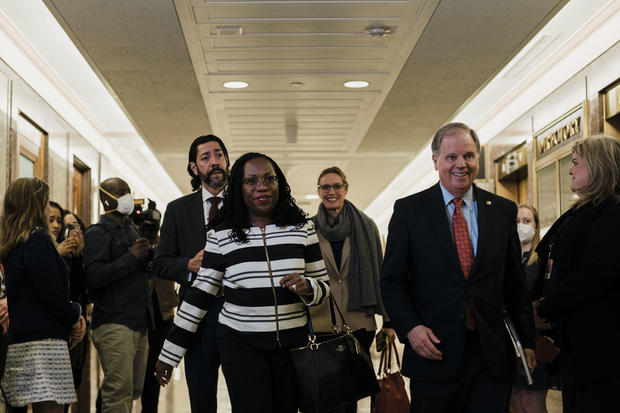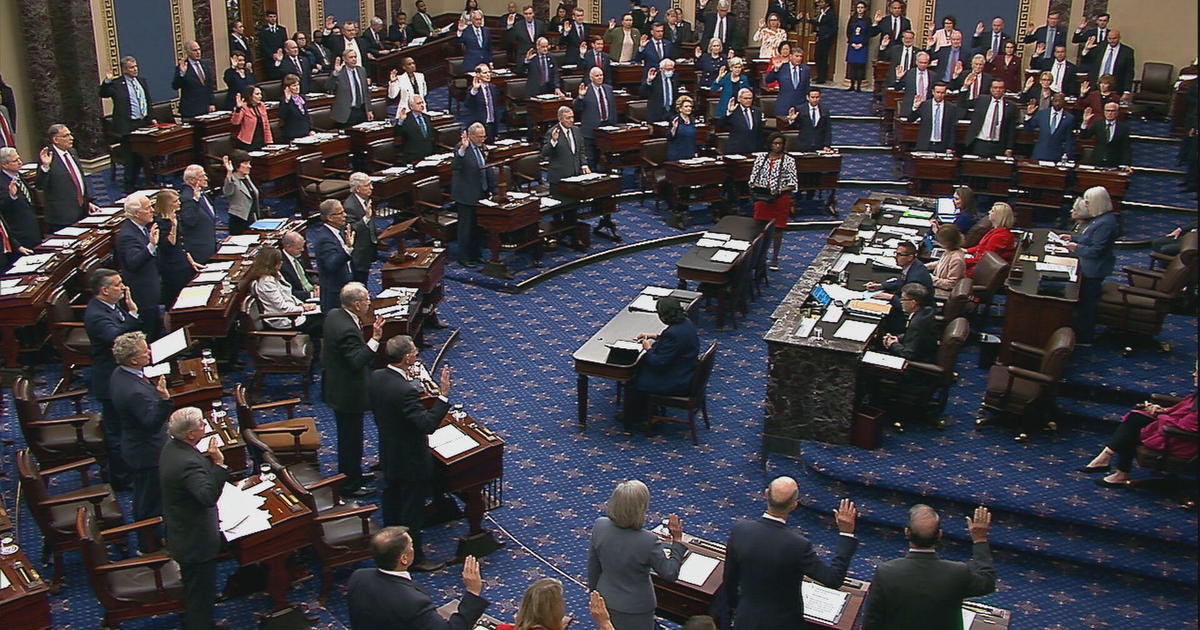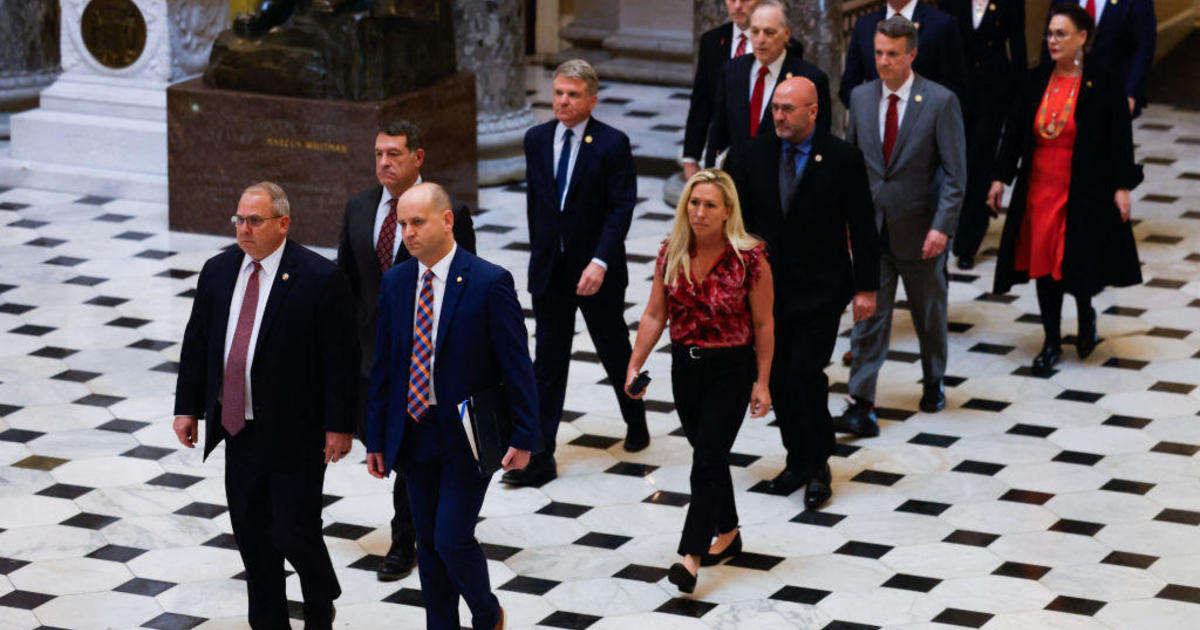What lies ahead for Supreme Court nominee Ketanji Brown Jackson in her confirmation process
Washington — Supreme Court nominee Ketanji Brown Jackson's confirmation process will enter its next phase Monday when she appears before the Senate Judiciary Committee to publicly make her case for why she should win approval to sit on the nation's highest court.
Jackson's quest to become the first Black woman on the Supreme Court — the White House hopes with bipartisan support — officially began when she was announced as President Biden's pick to succeed retiring Justice Stephen Breyer at the end of February. Since then, she has been meeting one-on-one with senators while preparing for the question-and-answer session, which will span two of the four days scheduled for the hearings that kick off 24 days after the president's announcement.
Democratic leaders are aiming to confirm Jackson, 51, before the Senate leaves Washington for a two-week recess on April 8.
Here is what Jackson, a judge on the federal appeals court in Washington, has been up to since Mr. Biden announced her as his nominee to the Supreme Court more than two weeks ago, and what is still to come in the Senate:
Senate meetings
Flanked by a coterie of aides and guided through the Senate by a "sherpa," former Democratic Senator Doug Jones of Alabama, Jackson has spent the past two weeks on Capitol Hill for meetings with senators on both sides of the aisle for so-called courtesy calls in the run-up to the confirmation hearings.
The in-person discussions began first with Democratic and Republican Senate leaders, as well as the heads of the Senate Judiciary Committee before moving to meetings with members of the Judiciary panel and other senators.
Some of the meetings have been short — Jackson's one-on-one with GOP Senator Lindsey Graham of South Carolina lasted just 15 minutes — while others have gone on longer. Republican Senator Susan Collins of Maine, seen as a possible vote of support, and Jackson spoke for roughly 90 minutes, for example.
Democrats have roundly praised Jackson after meeting with her, and all are expected to support her nomination when it comes to a vote on the Senate floor. For Republicans, who have applauded her experience and background, some have given little indication of whether they'll support Jackson's nomination, choosing to wait until after the confirmation hearings, while others were more forthcoming.
GOP Senator Marco Rubio of Florida, who met with Jackson on Tuesday, called her background "inspiring" but said their discussion "did nothing to ease my concerns that we have starkly different understandings of the Constitution and the role of the Supreme Court."
Still, Jones told reporters on Capitol Hill he believes the meetings have gone well and given Jackson an opportunity to speak with senators "candidly and openly"
"It's really an opportunity for them to understand her not only as a judge but as a person because you don't always get that in a hearing with the bright lights and the intensity of that you don't always get that," he said.
Confirmation hearings
Jackson's closed-door meetings on Capitol Hill will wrap up this week, after which she will appear publicly before the Senate Judiciary Committee for hearings that are scheduled to span four days.
The first day will consist of opening statements from the panel's members, followed by introductions of Jackson by supporters. The judge then will introduce herself.
The committee's questioning of Jackson will begin Tuesday and continue Wednesday for a second round. The panel will also meet privately Wednesday to discuss matters relating to Jackson's FBI background investigation, which occurs for each Supreme Court nominee.
Hearings will end Thursday with testimony from the American Bar Association, which assesses the qualifications of judicial nominees, and outside witnesses.
Jackson is no stranger to the Judiciary Committee, having already appeared before the panel three times: As a nominee to the U.S. Sentencing Commission, then when she was nominated to the federal district court and court of appeals in Washington. She was confirmed by the Senate to each post.
Expect Republicans on the committee to press Jackson about decisions on the lower courts involving a subpoena for testimony from former White House counsel Don McGahn and former President Donald Trump's efforts to block the release of his White House records to the House committee investigating the January 6 assault on the Capitol.
They'll also likely ask Jackson about her work on behalf of Guantanamo Bay detainees when she was an assistant federal public defender and in private practice, as well as her views on expanding the Supreme Court. One of the progressive judicial groups that has been vocal in support of her nomination, Demand Justice, is also spearheading a push to add seats to the high court.
Senate Minority Leader Mitch McConnell provided a roadmap of how the GOP is approaching Jackson's nomination in a Senate floor speech Tuesday, referencing Demand Justice — without naming the group — as a member of her "fan club."
"This group's entire purpose and fundraising model is waging war on the legitimacy of the judiciary itself," he said. "And for some reason, these people desperately wanted Judge Jackson in particular to end up on our highest court. Why? Well, senators will need to explore that."
McConnell also raised Jackson's background as a public defender and a member of the U.S. Sentencing Commission, suggesting Republicans will demand "all the necessary documents and records" from her time on the panel.
"We're in the middle of a violent crime wave, including soaring rates of homicides and carjackings. Even last summer when the pandemic posed a bigger challenge, more Americans said violent crime was a big problem than said COVID was," he said. "Amid all this, the soft-on-crime brigade is squarely in Judge Jackson's corner."
Jackson, though, has been endorsed by a number of law enforcement organizations, including the International Association of Chiefs of Police, Fraternal Order of Police, and dozens of former members of law enforcement.
After the confirmation hearings conclude, committee members will meet at a later date to vote on whether to report Jackson's nomination to the Senate favorably. Any member of the committee can request a nomination be held over for one week.
The committee is evenly split between 11 Democrats and 11 Republicans, but a tie vote does not preclude Jackson's nomination from proceeding to the full Senate for a vote.
Confirmation vote
It takes a simple majority of the Senate — 51 votes — for a nominee to the Supreme Court to be confirmed, and with Democrats controlling 50 seats and Vice President Kamala Harris casting tie-breaking votes, Jackson is expected to win approval in what would be a historic confirmation.
But a recent medical emergency for Democratic Senator Ben Ray Luján of New Mexico demonstrated the fragility of Democrats' majority. Luján suffered a stroke in late January and was away from Washington for several weeks. He returned to the Senate in early March, just after Mr. Biden announced Jackson as his Supreme Court nominee.
While Jackson does not need Republican support to be confirmed by the Senate, the White House and Democrats are hoping she receives bipartisan backing. Three Republican senators, Graham, Collins and Alaska Senator Lisa Murkowski, voted to confirm Jackson to the U.S. Court of Appeals for the District of Columbia Circuit last year, though it's unclear whether that support will carry over for her selection to the Supreme Court.
Republican Senator Mitt Romney of Utah told CNN he is open to supporting Jackson, and Senator Roy Blunt of Missouri, also a Republican, said that while he would "love to vote for the first Black woman on the court," judicial philosophy would be a "significant" factor, according to Politico.
Judiciary Committee Chairman Dick Durbin, a Democrat from Illinois, told reporters after meeting with Jackson earlier this month that part of his pitch to Republicans is that "this is a moment in the history of the United States, and I always want to try to be on the right side of history."
Jones said the White House is remaining optimistic Jackson can garner support from GOP senators, including those who opposed her nomination to the D.C. Circuit.
"If you look at the past statements of a lot of the Republican senators about what they're looking for in a justice and how they interpret the law and the Constitution and how they look to make sure that a justice defines and stays kind of in their lane and constrained by the Constitution, staying in their lane and not making policy and legislative, if you look at her record, that's exactly the kind of justice she will be," he said.
Taking the bench
If Jackson is confirmed by the Supreme Court by the Senate, she will not take the bench immediately.
Breyer told Mr. Biden in his letter announcing his retirement that he intends for his decision to take effect when the court ends its current term, either in late June or early July.
The Supreme Court will convene for its next term in October and is already slated to hear a blockbuster affirmative action case involving admissions policies at Harvard College and the University of North Carolina, and a religious freedom dispute.
Nikole Killion contributed to this report




